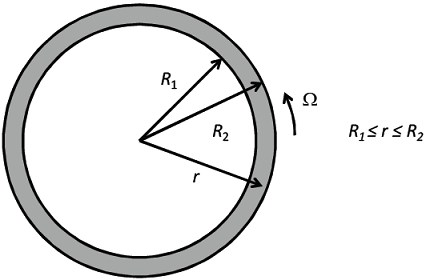GATE 2017-2018 :: GATE Chemical
-
An incompressible Newtonian fluid, filled in an annular gap between two concentric cylinders of radii R1 and R2 as shown in the figure, is flowing under steady state conditions. The outer cylinder is rotating with an angular velocity of Ω while the inner cylinder is stationary. Given that (R2 - R1) << R1, the profile of the θ-component of the velocity Vθ can be approximated by,

- For a Newtonian fluid flowing in a circular pipe under steady state conditions in fully developed laminar flow, the Fanning friction factor is
- In the Tyler standard screen scale series, when the mesh number increases from 3 mesh to 10 mesh, then
- Taking the acceleration due to gravity to be 10 m/s2, the separation factor of a cyclone 0.5 m in diameter and having a tangential velocity of 20 m/s near the wall is _________
- The effectiveness of a heat exchanger in the &NTU method is defined as
-
In a pool boiling experiment, the following phenomena were observed. P. Natural convectionQ. Film boilingR. Transition boilingS. Nucleate boilingWhat was the CORRECT sequence of their occurrence?
- A hole of area 1 cm2 is opened on the surface of a large spherical cavity whose inside temperature is maintained at 727 oC. The value of Stefan-Boltzmann constant is 5.67 * 10-8 W/m2 - K4. Assuming black body radiation, the rate at which the energy is emitted (in W) by the cavity through the hole, up to 3 digits after the decimal point, is ________
- The packing of an existing absorption tower is replaced with a new type of packing. The height of the packing and the inlet conditions are maintained the same as before. Tests reveal that the number of transfer units is lower than before. This indicates that the tower with the new packing, when compared to that with the old packing, will
- A wet solid is dried over a long period of time by unsaturated air of nonzero constant relative humidity. The moisture content eventually attained by the solid is termed as the
|
A.
increase in temperature of the cold fluid / decrease in temperature of the hot fluid
|
|
B.
actual exit temperature attained by the cold fluid / maximum exit temperature attainable by the cold fluid
|
|
C.
actual exit temperature attained by the hot fluid / minimum exit temperature attainable by the hot fluid
|
|
D.
actual heat transfer rate / maximum possible heat transfer rate from hot fluid to cold fluid
|

 ) is
) is  .
. .
. .
. .
.
 Whatsapp
Whatsapp
 Facebook
Facebook

